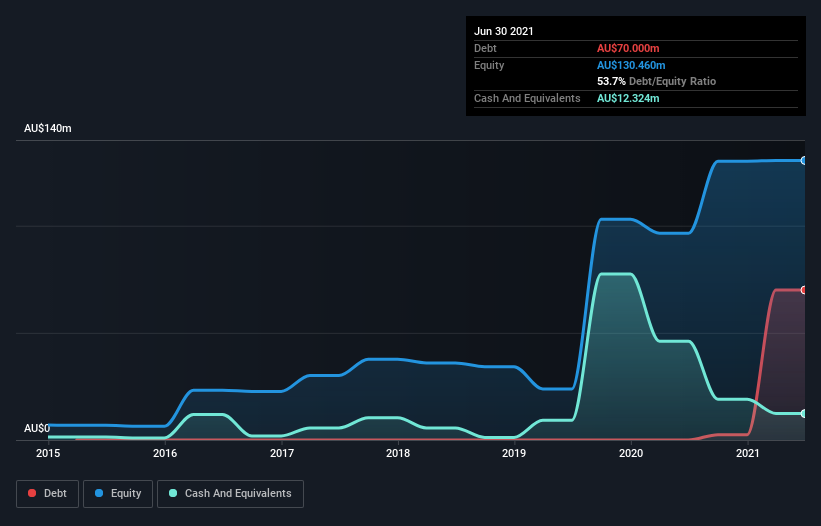David Iben put it well when he said, 'Volatility is not a risk we care about. What we care about is avoiding the permanent loss of capital.' When we think about how risky a company is, we always like to look at its use of debt, since debt overload can lead to ruin. As with many other companies Capricorn Metals Ltd (ASX:CMM) makes use of debt. But the real question is whether this debt is making the company risky.
When Is Debt A Problem?
Debt is a tool to help businesses grow, but if a business is incapable of paying off its lenders, then it exists at their mercy. If things get really bad, the lenders can take control of the business. However, a more usual (but still expensive) situation is where a company must dilute shareholders at a cheap share price simply to get debt under control. Of course, plenty of companies use debt to fund growth, without any negative consequences. When we think about a company's use of debt, we first look at cash and debt together.
See our latest analysis for Capricorn Metals
What Is Capricorn Metals's Debt?
As you can see below, at the end of June 2021, Capricorn Metals had AU$70.0m of debt, up from none a year ago. Click the image for more detail. However, it does have AU$12.3m in cash offsetting this, leading to net debt of about AU$57.7m.

How Healthy Is Capricorn Metals' Balance Sheet?
According to the last reported balance sheet, Capricorn Metals had liabilities of AU$59.0m due within 12 months, and liabilities of AU$110.2m due beyond 12 months. Offsetting this, it had AU$12.3m in cash and AU$1.00m in receivables that were due within 12 months. So its liabilities total AU$155.8m more than the combination of its cash and short-term receivables.
Since publicly traded Capricorn Metals shares are worth a total of AU$839.7m, it seems unlikely that this level of liabilities would be a major threat. But there are sufficient liabilities that we would certainly recommend shareholders continue to monitor the balance sheet, going forward. There's no doubt that we learn most about debt from the balance sheet. But it is future earnings, more than anything, that will determine Capricorn Metals's ability to maintain a healthy balance sheet going forward. So if you're focused on the future you can check out this free report showing analyst profit forecasts.
Given its lack of meaningful operating revenue, investors are probably hoping that Capricorn Metals finds some valuable resources, before it runs out of money.
Caveat Emptor
Importantly, Capricorn Metals had an earnings before interest and tax (EBIT) loss over the last year. Indeed, it lost AU$8.3m at the EBIT level. Considering that alongside the liabilities mentioned above does not give us much confidence that company should be using so much debt. So we think its balance sheet is a little strained, though not beyond repair. However, it doesn't help that it burned through AU$139m of cash over the last year. So suffice it to say we consider the stock very risky. The balance sheet is clearly the area to focus on when you are analysing debt. However, not all investment risk resides within the balance sheet - far from it. We've identified 3 warning signs with Capricorn Metals (at least 1 which shouldn't be ignored) , and understanding them should be part of your investment process.
When all is said and done, sometimes its easier to focus on companies that don't even need debt. Readers can access a list of growth stocks with zero net debt 100% free, right now.
New: AI Stock Screener & Alerts
Our new AI Stock Screener scans the market every day to uncover opportunities.
• Dividend Powerhouses (3%+ Yield)
• Undervalued Small Caps with Insider Buying
• High growth Tech and AI Companies
Or build your own from over 50 metrics.
This article by Simply Wall St is general in nature. We provide commentary based on historical data and analyst forecasts only using an unbiased methodology and our articles are not intended to be financial advice. It does not constitute a recommendation to buy or sell any stock, and does not take account of your objectives, or your financial situation. We aim to bring you long-term focused analysis driven by fundamental data. Note that our analysis may not factor in the latest price-sensitive company announcements or qualitative material. Simply Wall St has no position in any stocks mentioned.
Have feedback on this article? Concerned about the content? Get in touch with us directly. Alternatively, email editorial-team (at) simplywallst.com.
About ASX:CMM
Capricorn Metals
Explores, develops, evaluates, and produces gold in Australia.
Exceptional growth potential with flawless balance sheet.
Similar Companies
Market Insights
Community Narratives



